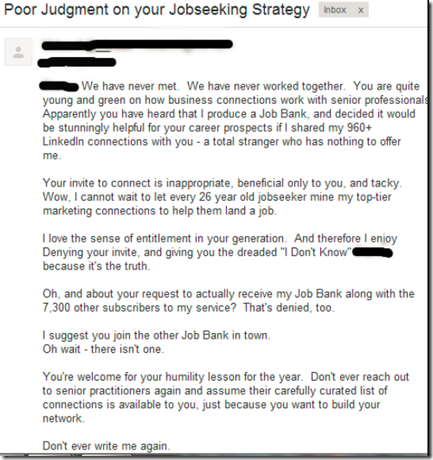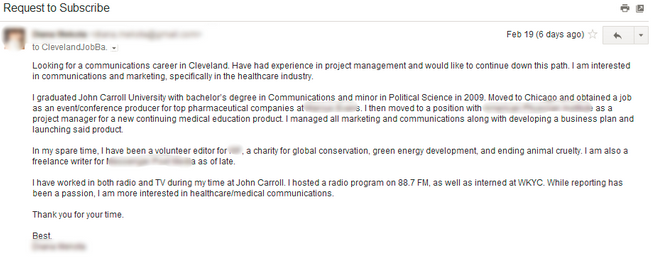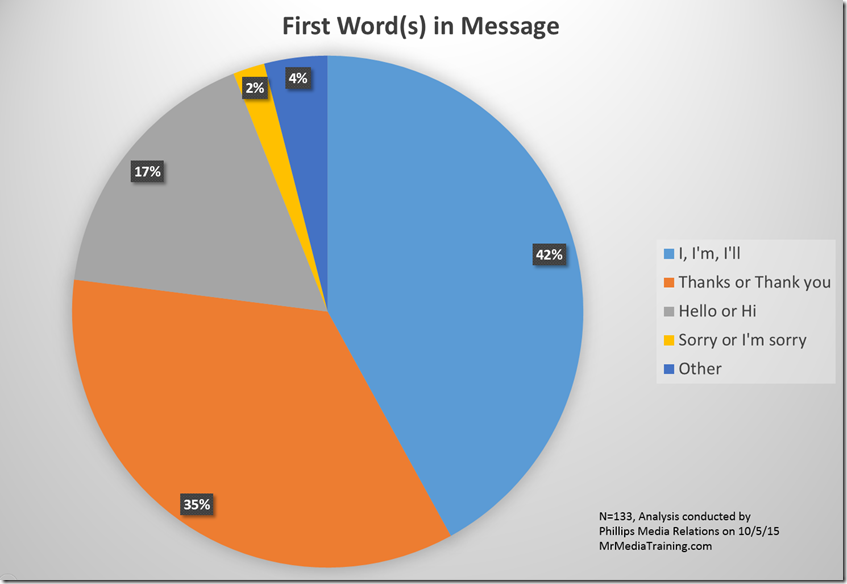In Defense Of That Cleveland PR Pro
By now, you may have heard about a Cleveland PR pro named Kelly Blazek, whose harsh rejection letter to a young public relations professional made the rounds last week.
Here’s the summary, as reported by Mark Naymik of the Northeast Ohio Media Group:
“[Blazek] produced and distributed a popular email that culled job openings from online job sites and from her own contacts. She worked hard for 10 years building her contacts and curating the list of people who receive the email, limiting recipients largely to those with experience in the field.”
The trouble started when a 26-year-old named Diana Mekota sent a LinkedIn request to Ms. Blazek along with a request to join her email list. Mekota was shocked when she received the following reply:
After her vicious broadside went viral, Ms. Blazek offered a chastened—and seemingly genuine—apology, which reads in part:
“My Job Bank listings were supposed to be about hope, and I failed that. In my harsh reply notes, I lost my perspective about how to help, and I also lost sight of kindness, which is why I started the Job Bank listings in the first place.
The note I sent to Diana was rude, unwelcoming, unprofessional and wrong. I am reaching out to her to apologize. Diana and her generation are the future of this city. I wish her all the best in landing a job in this great town.”
I do not and would never support Ms. Blazek’s approach. Not only is what she wrote awful—but as a purely tactical matter, it’s also dumb to risk one’s entire reputation by committing such thoughts to print.
But I do understand her frustration. I’m regularly contacted by people I’ve never met whose approach to networking similarly turns me off.
In some cases, someone I’ve never interacted with before writes, “Hey, I’m going to be in NYC tomorrow. Want to meet for coffee and talk about how we might work together?” (No. If you’re not serious enough about a potential partnership to contact me more than 24 hours in advance of a requested meeting, you aren’t serious enough about working together.)
Or it might be a person asking me for a job via a Twitter direct message. (If, instead of putting a thoughtful cover letter together you choose to send a casual 140-character tweet, you’re too casual about something I take seriously — my company.)
If we’re going to work together, I want a little courtship. I hope you know something about my work and are serious enough about your approach to put together a serious pitch. The young woman who contacted Ms. Blazek didn’t do that. Here’s Ms. Mekota’s original message:
Notice how she doesn’t express any knowledge about the Job Bank or its author? Notice how the entire message is self-focused and impersonal, with many of the sentences beginning with “I?”
Yes, Ms. Blazek’s nuclear response to a mild infraction was wildly inappropriate, but it should also be pointed out that this was not exactly the best pitch. A more humble approach from Ms. Mekota about forging a relationship with the more experienced pro would have been more effective. (I do, however, give Ms. Mekota enormous credit for her high-ground response to Ms. Blazek.)
Ms. Blazek’s approach is never acceptable. I would never treat someone who wrote to me so disrespectfully. But I do understand her frustration.
What do you think? Please leave your thoughts in the comments section below.




I’m not sure where the disconnect is, but networking is all about helping the other person. Ms. Mekota may have painfully learned that lesson from Ms. Blazek’s response. Let’s hope.
I get this kind of thing sometimes, too, and even when their approach is wholly distasteful, I will generally give people some constructive advice and feedback in response. No, I’m not perfect, but I believe strongly in leading by example (be the change you wish to see), and I have a strong value for sharing knowledge as a means of building a better, more informed community. Don’t get me wrong, I do get angry about self-serving, inconsiderate requests, but once I’ve cooled down I always try to give thoughtful feedback, or some sort of constructive advice.
I empathize with why you feel the way you do, but in terms of feedback, I and probably most of your audience would be more interested in hearing about what you would have done differently, or what type of advice you’d give to young up-and-comers. This incident is a cautionary tale and a teachable moment. Particularly this line from the apology letter:
“In my harsh reply notes, I lost my perspective about how to help, and I also lost sight of kindness, which is why I started the Job Bank listings in the first place”
Mave —
Fair point and great comment. Thank you for taking the time to leave it.
I share your desire to help and provide thoughtful feedback, and do so whenever possible. But the core of my argument is that time is a finite resource. For every self-serving request I may receive, I’m forced to make a choice: take time to craft a thoughtful response, or use that time to do something else I have to do, such as nourish my business or spend time with my family. On days when I have some extra time, I might choose the former; on days I’m already stressed, I’ll choose the latter. What I’ll never do is issue an inappropriate rebuke as Ms. Blazek did.
That said, I do believe — that at least to some degree — this post accomplished what you wanted in terms of advice to young up-and-comers: craft a personal and outwardly-focused pitch that demonstrates your awareness of their work.
I appreciate your thoughtful comment.
Brad
Interesting post, Brad. I hadn’t run across this bit of news yet, so thanks for mentioning it. I really can’t see any real upside to this for Blazek. She’s being taken to task by pretty much … everyone. So based on the sources you linked to in your article, the only one coming out on top is Mekota. I doubt she’ll have too much trouble finding a job fairly quickly now.
I suppose the argument could be made that Blazek started believing her own PR too much. And as she pointed out in her apology, she lost sight of her original purpose for building the job bank. This line of thought seems to be supported by Mr. Naymik’s article (I’m sensing he’s wasn’t a fan before this incident).
After reading Mekota’s note to Blazek, I can understand your partial empathy for the level of frustration she may have felt over yet another poor pitch. As people gain stature as thought leaders within a community, they get pummeled with requests, offers to partner, etc., from a vast sea of strangers. Unfortunately, that is the downside of being a thought leader — everyone wants those thoughts and wants to influence them in their favor.
Blazek forgot two very important rules here:
1) If you are going to create something designed to help people with employment and mentoring, then the focus needs to be constantly on them, not yourself.
2) Never use a nuclear option with someone using a shareable format in a time when 3 year olds are better at, and have more access to, social media than you.
Hopefully, Blazek will be able to salvage her reputation here and return to the original purpose of her job bank. Wouldn’t getting back to helping the younger generation with networking, mentoring and employment contacts would be a positive first step?
John,
Great comment. Regarding your final sentence, you’re exactly right. Unfortunately, Ms. Blazek reportedly deleted her Twitter account and her blog. Perhaps she realized that she’s simply too over-taxed to continue running the Job Bank, in which case I understand her decision. But she could also use that platform for good — as she originally intended — and use this incident to recommit herself to helping people in her community.
Thanks for writing, John. You’re a perfect example of someone who does social media (and communication in general) right. Certainly better than any 3-year-old. 🙂
Brad
This whole mishap could have been avoided if Blazek had opted for constructive criticism, rather than a scathing rebuke. It just goes to show that kindness is always free. In Blazek’s case, her impetuousness may have been very costly.
We all get that each new generation leaves the one that preceded it shaking their collective heads in disgust, but that’s why mentoring and coaching is so important. I believe Kelly forgot the awkwardness and ignorance of trying to make a name for herself, like this young professional did. And that lack of perspective led to an epic PR blunder.
Fortunately, her infraction wasn’t severe enough to result in being a professional anathema, but the notoriety was sufficient to evoke the proper sense of humility and change.
Desmond,
Your comment is perfectly stated – thank you.
Before being revealed as someone who could be rather cruel, Ms. Blazek received an award from her local IABC chapter for being an exceptional communicator. Hopefully she can use her previous successes to rebuild her brand with an increased focus on helping young professionals. It sounds like she possesses many skills from which they could benefit.
Best,
Brad
My advice to anyone struggling to handle a lot of inquiries they aren’t able to properly respond to is to have a few canned responses close to hand, tailored to the most freq
I simply don’t understand why the PR “pro” didn’t have a canned response. ‘Thank you so much for reaching out, we do try to reserve this site for professionals with a minimum of xx years of experience. Best of luck with your search and professional endeavors. Etc, etc.
Mark of a good PR person is their ability to deal positively with a negative situation professionally and move on. This is not
My advice to anyone struggling to handle a lot of inquiries they aren’t able to properly respond to is to have a few canned responses close to hand, tailored to the most frequent types of questions/requests. I came upon that approach a bit by accident. Earlier on when I had more time, I used to take time to craft responses. As I grew busier, I would cannibalize previous responses I’d written for tidbits that I thought might be helpful. Eventually I took the time to put together a few “template” responses that answered the most frequent questions I get, and have them close to hand when needed.
I customize those as much or as little as time and the situation allows/requires. It allows me to give people some value without taking up a lot of my time. In certain cases I also make it clear that while I don’t have time to go too much beyond that on every inquiry I get, I can provide further, more personalized consultation/coaching if they require, for a fee. Being up front that my time is worth money when providing more detailed advice/coaching honours my needs while simultaneously giving people an option to hire me if they so desire.
Mave and Ashley —
Great point regarding the template response. I also have developed some template responses for certain types of inquiries, which I always try to personalize with something that genuinely makes the recipient feel that I’ve taken the time to tailor my reply to them. Such an approach would have saved Ms. Blazek an awful lot of heartache.
Thanks for making such a smart contribution to this post.
Brad
While I do not disagree with all that has been said about Ms. Blazek’s response, I believe that your post also has a great message to those in the same position as Ms.Mekota. Today, with all of the social media, I’ve noticed young people seem to have hundreds and thousands of others who like/friend/follow them on the different platforms. They have not yet learned the benefits of a smaller, carefully crafted group. A simple opening of “I am new to the Cleveland area and my friend (Name), said that you may be a good resource” may have gone a long way in this case.